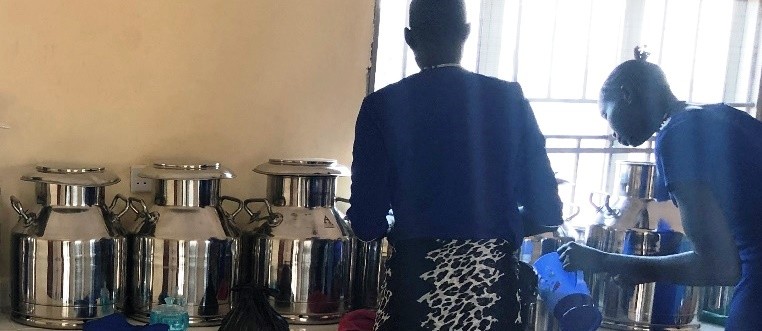A new milk bar in Bor town of South Sudan’s Jonglei State to support local milk vendors in selling safe-to-consume milk was launched on Friday.
The Food and Agriculture Organization of the United Nations (UNFAO) extended its appreciations to the United States Agency for International Development (USAID) for the funding of the project, the Food and Agriculture Organization of the United Nations (UNFAO) and implementing partner the Norwegian Refugee Council (NRC).
Funded under Sustainable Agriculture for Economic Resiliency (SAFER) program, the milk bar will provide an opportunity to the milk processing enterprise group to have an environment to process the milk, enhance their sales, maximize profit margins, and provide hygienic products to the consumers.
The new milk pasteurization, preservation and marketing facility was officially inaugurated by Jonglei State Deputy Governor Diing Akol Diing, accompanied by the State Minister of Agriculture John Dut Kuch. Also present at the ceremony were chiefs, women leaders and officials from FAO and NRC.
The new facility was constructed on a land allotted by Bor Municipal Council and has now been officially handed over to Jobwong Nhialic Women Group under the leadership of Deborah Yuang Jongkuch, the group chair and Mary Yom Garang as the facility manager. The milk bar is well equipped with milk collection containers, pasteurization and preservation equipment, testing tools, safe handling body wears, sitting space for customers, washrooms, storage facility, kitchen and solar-powered water pump.
In their work plan, Jobwong Women Group pledged to supply 220 liters of milk a day. One liter of milk goes for 500 SSP in Bor, implying the business will output a total revenue of 110,000 SSP (about $400 USD) a day.
The group leader Deborah Yuang said her group has been involved in this business for years and have received adequate training to enable them manage the business to grow. She cautioned against buying milk sold at the roadsides citing poor hygiene and encouraged people to make use of the new milk bar.
The deputy governor of Jonglei State Diing Akol applauded the women group for leading in milk marketing in Bor and commended the work done by FAO and USAID in supporting developmental initiatives in Jonglei.
“I am particularly very thankful to the FAO and USAID for supporting this project. It may look small at this stage but this is the beginning of industrialization of our milk production. We need to realize the actual financial value of our cattle away from their traditional use for marriage, pride and cultural activities, by properly marketing milk produce,” said Diing.
He also encouraged the women group to ensure proper management of the facility and not allow it to collapse.
Through implementation by FAO partner NRC, similar milk processing and marketing facilities have been implemented in two other locations of Jonglei State including Anyidi and Twic East. These facilities will be able to keep and preserve milk for a longer time as it is sold so that milk vendors don’t go into loses, with milk being a highly perishable commodity.
South Sudan is one of the rich countries in livestock wealth in African with over 12 million cattle. Most communities in South Sudan keep cattle as a symbol of wealth and prestige – mostly being used to settle hefty bride prices – while also being used as direct source of food in form of milk and meat.
Jonglei is one of the wealthiest states in South Sudan in cattle wealth that is not well commercialized to realize their economic value.




